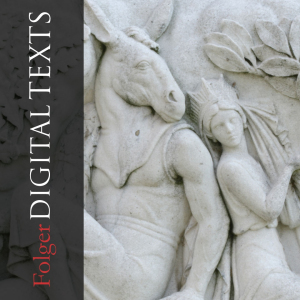What’s that you say? Your newest passion is the burgeoning world of internet Shakespeare editions? Well! Today’s your lucky day, because I’m about to start learning all about internet Shakespeare editions (and wondering how we can make them better, or more specific, or less Bardocentric), because this year I’m in a workshop about internet Shakespeare editions at SAA, and it’s time to get crackin’ on my contribution. But first I need to write a seminar for school, so, for now, speaking of digital texts…
I’d like to take a moment to think about the newly-launched Folger Digital Texts from The Folger Shakespeare Library.

- Folger façade image: Keith Weller Photography
“The goal of the Folger Digital Texts project is to create an open repository of the Shakespearean texts from the Folger Shakespeare Library Editions for readers, students, scholars, and performers to use freely for noncommercial purposes.”
To be honest, I don’t usually consult Folger editions first because I’m not in the classroom setting that makes them shine most, but this is an excellent addition to the world of online textual resources. So far I’m really enjoying playing on the site, and though it’s so easy to use you hardly need to take my word for it, I thought I’d summarize a few salient features here:
1. The interface is attractive and straightforward. Two clicks to get to anything you want. The frames are a good choice (cf. numbers 5-6).
2. Free pdf downloads of the play texts. I just uploaded Much Ado to my Kindle and it looks great.
3. Annotations, sadly, are not included, but an easy-to-find link sends you to a purchase page for the print edition. [I don’t know why this disappointed me at all. It makes perfect sense: why buy the cow if you get the milk for free?]
4. A synopsis, the dramatis personae, and an Act/Scene table of contents attend each play on the left side of the page at all times.
5. Joining the play on the right side are handy jump and search options:
Jump to Act/Scene/Line, Page Number (i.e. the odd numbered pages w/the text, correlating to the print edition), or Folger TLN (provided within the text in addition to scene-divided line numbers).
Search results show up in the right-hand frame with the in-text citation and the search term highlighted. The Texts homepage allows you to search the entire database of plays. At the moment Boolean operators don’t return results, but phrases do. A search for ‘disguise’ in King Lear looks like this:

6. In the middle frame sits the text itself. It looks nice, but be warned: it’s formatted to look exactly like the print edition. So the flow of reading the whole play on the screen is interrupted by horizontal lines and page headers about every 25 lines of text. My guess is that most people will use this for the database access to content more than for simple reading so it’s no tragedy, just notable. Lines per scene numbered to the right in black; FTLN are to the left of the text, smaller and in grey.
7. Hovering over a stage direction with broken brackets lets you know you’re looking at a Folger emendation. But why broken brackets? Users of the Oxford Shakespeare (at least users who are as familiar with Oxford Shakes style as they are unfamiliar with Folger style) will initially find this confusing: these appear to be straightforward emendations, not doubtful readings or possibilities. Luckily for me Lear was a good play to begin exploration.
[Brackets] indicate text from F not in Q, like so: 
<Chevrons> indicate text found in 1st Q not in F:

8. Just like we see no footnotes, we also (and this is the biggest weakness to me) see no collation line. I realise that’s a specialist request in some ways, but I’d argue it’s also a simple textual disclosure request – since it already exists in print, I’d like it to be an option digitally.
9. To end on a high note, the Folger have provided a tremendously exciting, open-access, free-to-all offer: the embedded source code is available to download and use for non-commerical project and app creation. Are you kidding? Thank you, Folger Shakespeare Library, for doing digitally what you do in reality – leading the research community toward better practice with care and expertise.
And no, I don’t care if that sounds like I’m sucking up. I love the Folger. I love it so much Imma go there tomorrow. I hope you go to their Digital Texts tomorrow. We’ll have reason to return again and again – the blog post promises the rest of the canon, poems, and even some plays written by contemporary playwrights in the coming year.
[That last bit is most intriguing: is the Folger about to expand editorially to join the Revels/Arden EMD market? Time (or someone in the know) will tell.]